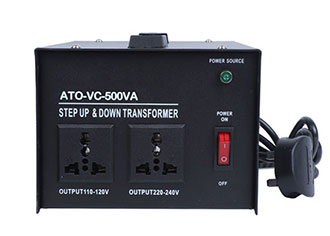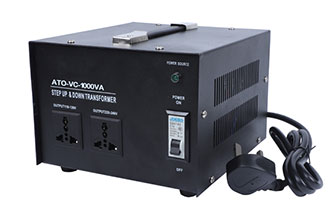In the vast field of electrical and electronic technology, voltage converters play a crucial role as key power conversion devices. They can effectively convert voltage to meet the power quality demands of different electrical equipment and facilitate the optimized distribution and efficient use of global electricity resources. This blog explores the fundamental knowledge of voltage converters, their diverse types, a wide range of applications, and future development trends, providing comprehensive reference and guidance for industry professionals and enthusiasts alike.
Fundamentals of Voltage Converters
As the name suggests, a voltage converter is an electrical device capable of changing the magnitude of AC voltage without altering its frequency. Its core principle is based on the law of electromagnetic induction, where voltage transformation is achieved through electromagnetic coupling between the primary and secondary windings. Specifically, when AC voltage is applied to the primary winding, an alternating magnetic field is generated in the winding, which induces an electromotive force in the secondary winding, thus achieving voltage conversion.
The main components of a voltage converter include the core, windings, insulation structure, leads, and tap switches. The core, being the key part of the magnetic circuit, is responsible for conducting and enhancing the magnetic field; the windings, as part of the circuit, enable voltage transformation through varying coil configurations; the insulation structure ensures electrical isolation between components, preventing short circuits and other safety issues; and the leads and tap switches connect external circuits and adjust the output voltage to meet the needs of different loads.
Types of Voltage Converters
1. Single-Phase and Three-Phase Converters: Based on the number of input voltage phases, voltage converters are classified into single-phase and three-phase converters. While similar in structure, three-phase converters offer higher efficiency and stability in handling high-power applications.
2. Transformer and Autotransformer: Traditional transformers achieve voltage conversion through two independent windings, while autotransformers share part of the winding, allowing for voltage regulation with the advantages of smaller size and lower cost, although with a limited adjustment range.
3. Electronic Voltage Converters: With the advancement of power electronics technology, electronic voltage converters have become increasingly popular. These converters utilize semiconductor devices (such as transistors, IGBTs, etc.) to control circuit switching, providing precise voltage regulation and fast response, widely used in low-power, high-precision applications.
4. Switching Power Supply: A specific type of electronic voltage converter, switching power supplies convert DC voltage into high-frequency AC voltage through high-frequency switching technology, then rectify and filter it to obtain stable DC or AC output voltage. These have the advantages of small size, lightweight, and high efficiency.
Applications of Voltage Converters
1. Power Transmission and Distribution: In power systems, voltage converters are widely used in high-voltage transmission, medium-voltage distribution, and low-voltage supply to gradually step down voltage levels, ensuring that electrical energy is safely and economically delivered to end-users.
2. Industrial Control and Automation: In industrial automation, voltage converters provide stable power supplies for various devices such as motors, sensors, and actuators, ensuring smooth production processes.
3. Consumer Electronics and Household Appliances: From smartphone chargers to high-power household appliances such as air conditioners and refrigerators, voltage converters are ubiquitous. They not only provide the necessary voltage conversion but also integrate safety mechanisms like overload protection and short circuit protection to ensure user safety.
4. Renewable Energy Generation: In renewable energy systems like solar and wind power, voltage converters are responsible for converting the unstable output voltage of generators into grid-compatible voltage, enabling green energy to be transmitted to the power grid.
5. International Travel and Equipment Compatibility: For international travelers, voltage converters (or travel adapters) are indispensable companions. They adapt to different countries' socket standards and convert the local voltage to the voltage required by the device, ensuring electronic equipment functions properly abroad. The cost-effective 1000W voltage converter sold by Inverter Online Shop is made of high-quality materials and can be switched between 110V AC or 220V AC input voltage, making it ideal for global travel.
Future Development Trends
1. Energy Efficiency: With the intensifying global energy crisis and rising environmental awareness, energy efficiency will become a key direction in the development of voltage converters. By adopting new materials, optimizing designs, and improving conversion efficiency, energy consumption can be reduced, and carbon emissions minimized.
2. Intelligence and Networking: As IoT, big data, and cloud computing technologies become widespread, voltage converters will develop

toward intelligence and networking. By integrating sensors, controllers, and communication modules, they can enable remote monitoring, fault diagnosis, and automatic regulation, enhancing device reliability and maintenance efficiency.
3. Miniaturization and Integration: With the continuous advancement of electronic component technology and packaging innovations, the size of voltage converters will become further reduced, and their functions more integrated. This not only saves space and reduces costs but also helps promote the development of emerging fields such as portable and wearable devices.
4. Green and Eco-Friendly Design: Future voltage converters will place more emphasis on eco-friendly design, using non-toxic and harmless materials, reducing the use and emission of hazardous substances, and improving the recycling rate of waste products, achieving green solutions throughout their lifecycle.
In summary, as an essential component in the field of electrical and electronic technology, voltage converters have vast prospects for technological development and application. Home Power Inverter believes that with advancements in technology and changes in market demand, voltage converters will continue to evolve toward energy efficiency, intelligence, miniaturization, integration, and environmental friendliness, contributing more to the sustainable development of human society.
